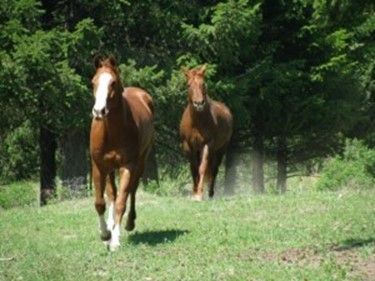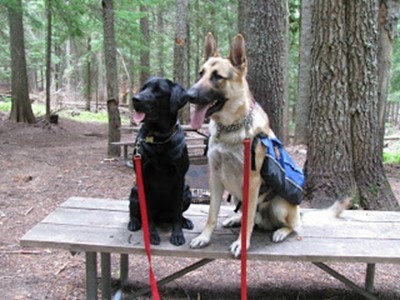Guest post by Stephanie Dayle
If you own animals, you need to have an emergency plan for them too. Leaving your animals at home with extra food and water is NOT A PLAN. Not only does it put them in danger but it endangers the lives of people who might try to rescue them.
If you have pets or livestock, you need to be able to keep track of them, care for them, feed them, and protect them during an emergency, even a LONG TERM emergency. If you can’t do that, you don’t need them. This sounds harsh but reality is sometimes. You need to think ahead with plans for water, food and evacuation.
FOOD
Owning horses, chickens or other livestock means you always should keep enough hay or feed on hand to feed them and make it all the way through the winter until the next growing season. You also need a way to get water to them if there was a long term power outage. This is the only way to completely protect them from anything that could affect the area’s supply of feed and water. For preparedness purposes avoid the bad habit of buying a ton of hay or a bag of feed, using it, then running to town to buy more only when it’s gone. What if there was no hay available in town or anywhere else near by? Instead, get into the habit of having a large supply of feed that you rotate by using the oldest first and putting the new stuff in the back. You would continue buying new feed to replace what you just used, but you would have a large supply on hand at all times.
Don’t be to concerned about it going bad, most livestock feed will last at least 6 months if not longer when stored properly, most commercial dog and cat food will last up to a year if not longer. If you can’t afford that much feed or don’t have the storage space for it, you might consider reducing your herd or adding storage space so that it meets the demands of at least one winter for all of your animals.
The only exception to this would be a butchering plan. With livestock, such as cattle meant for beef, it is possible that if faced with a draught (such as ranchers in Texas and the midwest recently faced) or a food shortage, the animals may be butchered at an earlier date than originally planned. This may not produce the best meat, but it would prevent any suffering on the animal’s part. Euthanizing your animals should only be a last resort.
Other animals need a backup food supply too. Cats, dogs, birds – no one wants to run out of food right in the middle of a crisis so have at least a 3 month supply if not more stored at home (we have at least an eight month supply on hand a all times). In fact, you may want to store it with some travel bowls and a pet first-aid kit so that if you, your family, and your pets ever have to evacuate, it’s all in one spot easy to grab. Click here to see a GREAT article on how to store pet food for emergencies!
EVACUATION PLANS
Let’s say you live in the city with a few dogs and a hurricane is headed your way. Evacuation is mandatory, and disaster is imminent. Here is how you could be prepared and make a plan. These plans may not work for everyone, but I hope they give you some ideas and jump-start your own planning process.
Plan A – You have pre-scouted some “pet friendly hotels” in a small town several hours from you. Knowing that the hotels will fill up exceedingly fast, you call ahead and secure a room, you leave town WITH YOUR PETS as soon as possible so as not to get caught in grid lock risking the loss of your room. This doesn’t take long since you keep their first-aid kit, stored with some extra food and travel bowls in your laundry room.
If they are taking cards, use one that you leave cleared off for “emergencies only” or better yet a pre-paid cash card, as you may need the real cash you have for extra food or whatever you left behind. While you were planning, you also wrote down the numbers of the local urgent care center, the local vet office, and a doggie day care center. You grab your own emergency kit (and your family’s if you are evacuating with others) with your pet’s kit remembering to grab leashes and poop bags, and important documents. Next you pile your family and your dogs (in their crates if they will fit) in your car, and hit the road with your tank nearly full of gas because as a prepper you stopped letting it run empty a long time ago. You have a couple of routes to the small town in mind in case one route is blocked. With emergency cash on hand to pay for a week up front, you arrive at the hotel to check everybody in.
This plan gives you a “base of operations” where you can assess the damage and arrange for repairs on your home or make other living arrangements if need be.
Plan B – You have family four hours away from you and have cleared it with them ahead of time that you AND YOUR PETS can stay with them in case of an emergency. You repeat the above evacuation process and pre-planning.
Plan C – You don’t have any family nearby and can’t afford a hotel. You can still figure out where local rescue groups will be setting up temporary animal shelters for the disaster, you pack up and take your pets there knowing most “people shelters” do not allow pets. You arm yourself with vaccination certificates, photographs and any ownership papers to prove that you do in fact own these dogs so you can claim them when the disaster is over. After you drop your pets off at a shelter you and your family will go find a shelter that will take all of you as a group. Hopefully you will pick your animals up at the shelter when you are allowed to return home.
Evacuation plans also need to include livestock, and somewhere for them to stay with food and water until you’re home is safe again. If, for example, a wildfire is threatening our place, I would take my horse and all the documents I need to prove ownership, to either my friends place 10 miles away, or my parent’s place 60 miles away. I have discussed this plan with both parties and have permission to drop him off at either location in case of emergency. My truck and horse trailer is in good working condition, and my horse is completely trailer broke, meaning he will load up in a horse trailer and unload for anyone (all “must haves” for horses; slacking on trailer training could endanger their lives and the lives of other people). If I were to be at work when disaster strikes I may not be able to get back to the house in time. So our neighbor has permission to scale our fence, access a couple of hidden spare keys, and has agreed to throw Pat in the trailer and evacuate with him.
Part of being a responsible pet/livestock owner means having a plan. While I don’t expect anyone to use my plans I want you to start thinking about what YOU could do. Tragedy strikes most often when we are flat footed. Sit down today and start answering some of those “what if questions”.
Start now to make sure you are staying prepared.
Via: American Preppers Network






 Follow
Follow
Leave a Reply